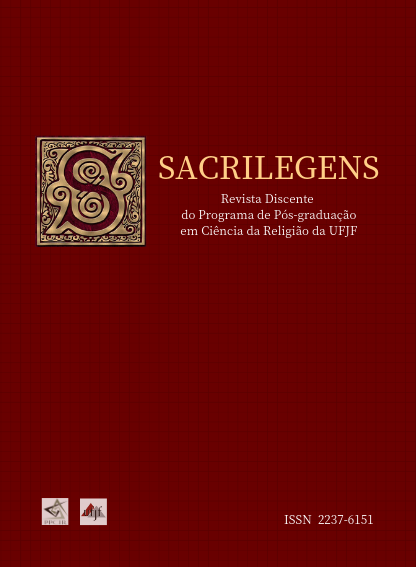Heschel: from pathos to dialogue
Keywords:
Heschel, Hassidism, Sacred Humanism, Interreligious DialogueAbstract
This article presents the Heschel’s thought in his main points related to the possibility of Interreligious Dialogue. The text is divided into two parts. Initially there is a biographical presentation of Heschel and the influences of Hasidism in the formation of his thought. Secondly, the main philosophical and theological concepts are considered, especially the concept of divine pathos, and can say that Heschel's reflections are presented as reference for the Jewish understanding of pluralistic
context. Then, in conclusion, presents the activities and engagement in social issues and
the search for inter-religious dialogue.
Downloads
References
CUNNINGHAM, Philip A. "No Religion is an Island": Catholic and Jewish Theologies of Each Other. In: Modern Judaism, v. 29, n.1, fev. 2009, pp. 27-33. Disponível em: <http://muse.jhu.edu/journals/mj/summary/v029/29.1.cunningham.html> acesso em 20.abr. 2010.
FAIRSTEIN, Morris M. F. Abraham Joshua Heschel and the Holocaust. In: Modern Judaism, v. 19, n. 3. Disponível em
<http://muse.jhu.edu/journals/modern_judaism/v019/19.3faierstein.html> acesso: 20.abr. 2010.
GOSHEN-GOTTSTEIN, Alon. No Religion Is an Island: Following the Trail Blazer. In: Shofar: An Interdisciplinary Journal of Jewish Studies, v. 26, n. 1, 2007, pp. 72-111.
Disponível em: <http://muse.jhu.edu/journals/sho/summary/v026/26.1.goshengottstein.html> acesso: 20.abr. 2010.
HAZAN. Maria G. Filosofia do Judaísmo em Abraham Joshua Heschel: Consciência Religiosa, Condição Humana e Deus. Dissertação de Mestrado em Ciências da Religião – PUC/SP, 2006.
HESCHEL. Abraham J. Deus à procura do Homem. São Paulo: Paulinas, 1975.
_______. No religion is an island. In: KASIMOW, Harold. & SHERWIN, Byron L (ed.). No religion is an island: Abraham Joshua Heschel and interreligious dialogue. Maryknoll: Orbis Books, 1991. pp. 3-22.
_______. O homem à procura de Deus. São Paulo: Paulinas, 1974.
_______. The concept of man in Jewish thought. In: _______. To grow in wisdon, an anthology. Jacob Neusner (ed.). New York: Madson Books, 1990.
KASIMOW, Harold. Heschel’s View of Religious Diversity. In.: Studies in Christian-Jewish Relations, v. 2, n. 2, 2007. Disponível em: <http://escholarship.bc.edu/scjr/vol2/iss2/> acesso: 13.abr. 2010.
KRAJEWSKI, Stanislaw. Abraham Joshua Heschel and the Declaration Dabru Emet. In: Shofar: An Interdisciplinary Journal of Jewish Studies. v. 26, n. 1, pp. 154-168.
Disponível em: <http://muse.jhu.edu/journals/sho/summary/v026/26.1.krajewski.html> acesso: 20.abr. 2010.
LEONE. Alexandre G. A Imagem Divina e o Pó da Terra: humanismo sagrado e crítica da modernidade em A. J. Heschel. São Paulo: FAPESP, 2002.
_______. Mística e Razão na Dialética Teológica Rabínica: A Dinâmica da Filosofia de Abraham J. Heschel. Tese de Doutorado em Letras – USP, 2008.
_______. Tora, mística e razão em Heschel. (mimeo), 2010.
MARMUR, Michael. In search of Heschel. In.: Shofar: An Interdisciplinary Journal of Jewish Studies, v. 26, n. 1. 2007. pp. 9-40.
OTTO, Rudolf. O Sagrado: os aspectos irracionais na noção do divino e sua relação com o racional. Tradução Walter O. Schlupp. São Leopoldo: Sinodal/EST; Petrópolis: Vozes, 2007.
ROSENBERG, R. A. Guia Conciso do Judaísmo: História Prática e Fé. Tradução Maria Clara De Biase W. Fernandes. Rio de Janeiro: Imago, 1992.
TUCKER, Gordon. A.J. Heschel and the Problem of Religious Certainty. In: Modern Judaism, v. 29, n. 1, February 2009, pp. 126-137. Disponível em: <http://muse.jhu.edu/journals/mj/summary/v029/29.1.tucker.html> acesso: 20.abr.2010.
Downloads
Published
How to Cite
Issue
Section
License
 Sacrilegens is licensed under a Creative Commons Attribution 4.0 International License.
Sacrilegens is licensed under a Creative Commons Attribution 4.0 International License.










